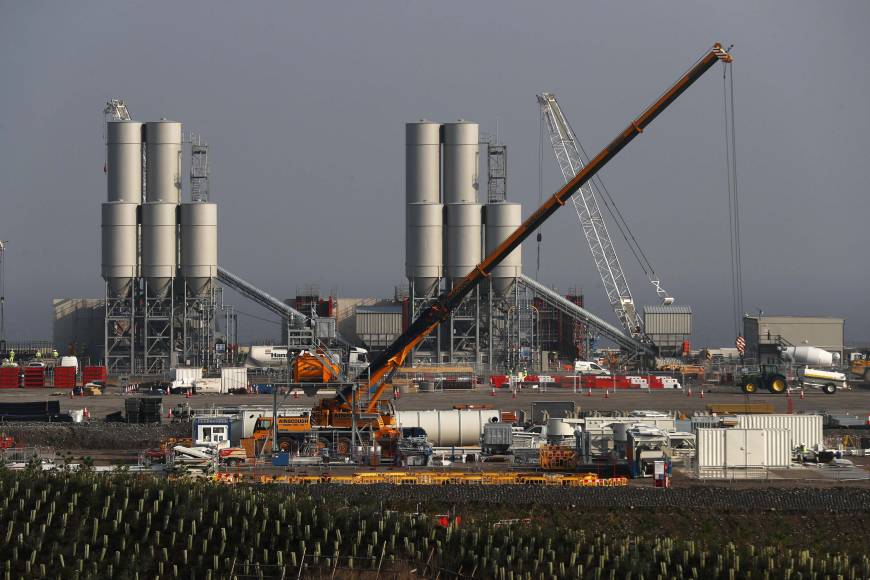
Hinkley Point C nuclear power station site is seen near Bridgwater, England, on Wednesday. | REUTERS
PARIS – As Britain greenlights its first new nuclear power plant in more than 20 years, experts diverge on the role of nuclear energy in the quest to cap global warming at less than 2 degrees Celsius...
The broad challenge in meeting that goal — the cornerstone of the Paris Agreement inked in December by 195 nations — is decarbonizing the world economy as quickly as possible.
“We need a global transition to primarily zero carbon energy sources by midcentury,” said Rachel Cleetus, lead economist and climate policy manager for the Washington-based Union of Concerned Scientists (UCS).
Along with other think tanks and advocacy groups sounding the climate change alarm, the UCS is not a champion of nuclear power.
But with fossil fuels still accounting for 80 percent of total energy consumption, they say, the splitting or fusing of atoms — despite concerns about cost and safety — still has a role to play.
“The fewer options on the table, the greater the challenge,” said Jim Williams, director of the U.S. Deep Decarbonization Pathways Project (DDPP).
The consensus among experts trying to map that transition “is that it will be harder to meet climate goals without nuclear energy in the mix,” he said by phone.
Today, 31 countries have nuclear power plants accounting for just under 11 percent of global electricity generation.
A dozen of them depend on nuclear for at least a third of their juice, including France (75 percent), along with Hungary, Slovakia and Ukraine (50 to 55 percent).
In the U.S. that figure stands at about 20 percent, as in Britain — not counting the Hinkley Point plant, which is to come on line in 2025. The government decided Thursday to proceed with the £18 billion ($23 billion) plant in southwest England, financed by Chinese nuclear power provider CGN and French energy group EDF, but said it would impose “significant new safeguards” on future foreign investment in nuclear power and other critical infrastructure to “ensure that significant stakes cannot be sold without the government’s knowledge or consent.”
Solar and wind capacity have expanded rapidly worldwide, as costs have plummeted. And several new technologies for storing the energy they generate show huge promise for rapid deployment.
But renewables still only account for a thin slice of overall energy production.
“Nuclear power is needed in conjunction with renewables to meet our obligations to reduce greenhouse gas emissions,” said Juan Mathews, a visiting professor at the Dalton Nuclear Institute of the University of Manchester.
At the same time, global warming is accelerating more quickly than predicted, and its consequences are being felt more sharply, added Cleetus.
“The scope and impacts of climate change — including rising seas, more damaging extreme weather events, and severe ecological disruption — demand that we consider all possible options for limiting heat-trapping gas emissions,” she told AFP.
Not all climate and energy experts, however, are convinced that nuclear is crucial for keeping a lid on global warming.
“In fact, it’s a barrier,” said Tom Burke, chairman of London-based E3G, a climate change think tank.
“It takes away capital from things that would deliver faster, cheaper and smarter low carbon electricity systems,” he said.
It also runs counter, he added, to a wider trend toward decentralized, flexible power generation.
For climate analyst Martin Kaiser of Greenpeace International, “the only feasible and secure way to keep global warming well below 2 degrees Celsius is a massive swing toward renewables.”
A “100 percent” renewable energies revolution is still possible, he insisted.
For Williams, potential climate catastrophe trumps the risks associated with nuclear power — radioactive waste, accidents such as happened in Fukushima and Chernobyl — only with strict regulatory oversight in place.
He highlighted the contrast between gold-standard Switzerland and China, which has 30 nuclear plants built or under construction, and another 20 in the pipeline.
“China has relatively understaffed and undertrained regulatory authorities — that is worrisome,” he said.
“Would I live next to a nuclear power plant if I thought that was really important to mitigate climate change?
“In the first case (Switzerland) I would, but in the second I wouldn’t.”
AFP-JIJI, AP
source: http://www.japantimes.co.jp/
original story HERE
Get more of The Global Warming Blog. Bookmark this page and sign up for the blog’s free RSS Feed. Sign up for free Global Warming Blog by clicking here. You will automatically be emailed a regular summary of the latest global warming headlines.
To help do something about the climate change and global warming emergency, click here.
Sign up for our free Global Warming Blog by clicking here. (In your email, you will receive critical news, research, and the warning signs for the next global warming disaster.)
To share this blog post: Go to the Share button to the left below.

Be the first to comment
Sign in with